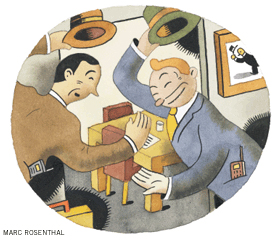
When Emily Post penned her first etiquette book in 1922 to guide America’s burgeoning middle class, one never wore white after Labor Day and a man would always stand when a woman entered the room. Times have changed, but good manners have never gone out of style, argues Peter Post C’72, a marketing executive who maintains his great-grandmother’s legacy as an officer of the Emily Post Institute, a “civility think tank” based in Burlington, Vt.
With his sister-in-law, Peggy Post, he has co-written The Etiquette Advantage In Business: Personal Skills for Professional Success (Harper Collins). It’s the first Emily Post title to deal solely with business etiquette, and as such, covers a vast amount of material.
The 600-page tome extends advice on how to shake hands and answer the phone effectively, defuse office gossip and tactfully take apart an artichoke over a business lunch. It also moves far beyond Emily Post’s early-20th-century world of weddings and teas, with tips on countering sexual harassment, practicing gender-free chivalry and exercising cell-phone restraint.
“I think that the underlying concepts haven’t changed a bit,” says Post. “Those principles include respect, consideration and honesty.”
Modern-day etiquette is “all about feeling comfortable with yourself and having the ability to make good decisions,” and those who possess it, he says, have a better chance of getting the job or the promotion.
One of the most career-damaging moves a person can make in today’s workplace, Post warns, is to forget that “e-mails are public documents, pure and simple.” He has heard many variations of the horror story about the manager who fires off an angry e-mail to criticize an employee and inadvertently broadcasts the message around the office. “Never put into an e-mail document something you wouldn’t say on a fax or post on a wall.”
Technological devices may contribute to a more efficient workforce, but as the example above shows, they also add confusion, Post says, “because people haven’t yet figured out what are the most appropriate ways to use them. Letters have been around for umpteen years. But learning how to deal with instant messaging—and cell phones. Cell phones just drive people nuts.”
Many places, including some big-city restaurants, are now banning cell phones because they’ve been abused by diners loudly conducting business at the table. But when in Rome—“In Italy,” notes Post, “using a cell phone in a restaurant is not frowned on, so you can’t react the same way that you might react here.” (To help decipher these conflicting conduct codes, his book features a section on business etiquette around the world.)
“Etiquette isn’t rules or guidelines that affect everybody equally all of the time and in every place the same way,” Post says. “What kind of dress you wear if you work at Ben & Jerry’s in Vermont compared to Chase Manhattan in New York City has to do with the two cultures. Every culture is different; you have to respect the culture you’re in.”
Technology may have drastically changed since his great grandmother’s day, but nothing has altered the old-fashioned faux pas of being late, according to Post. “I think being late to work, to a meeting or to an appointment is such a mark of disrespect to the persons around you. You have to be organized enough so you don’t let it happen.”
One of the most significant factors affecting office etiquette over the past 25 years has been the full-scale entry of women into the workplace. “That has caused profound changes in how we handle being at work and being at home,” observes Post. “As a result of that, I think, people are looking at it as a place they want to be a more pleasant environment. And they’re making noise to ensure that happens.”
Employees are also no longer staying in one job for their entire career, but are “walking out to find new places that are more pleasant to work in,” Post says. “Businesses have got to wake up to this reality.”
With that in mind, the Emily Post Institute has recently teamed up with the Philadelphia-based Richardson Company to offer business-etiquette training at workplaces around the country. The seminars will be geared to employees and managers at all levels of the corporate hierarchy. “If the top people are not buying into the principles of business etiquette, it won’t happen.”
But, Post says, “When you can change a culture and change the habits within that culture, in the final analysis you wind up with a more positively charged workplace.”




